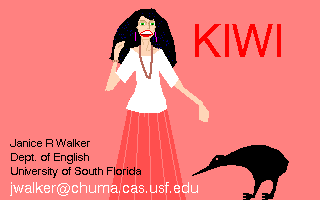I am currently working on an expanded version of my style sheet in response to hundreds of e-mail messages and questions from students, parents, researchers, and scholars from different disciplines from around the world that I hope will not only address the print-based documentation style we still need, but which will look forward to where we may be headed. Richard Long's presentation at this year's CCCC in Milwaukee pointed out that most of us are still writing print-based discourse and, more or less, just pasting it on the Net. And those of us who teach writing using electronic technology and the Internet in our classes are still, for the most part, teaching print-based writing.
Harnack and Kleppinger's conclusions, too, reflect a print-based model. For instance, they recommend that teachers require students to "print copies of cited material." I think we need to be careful about making recommendations that not only could be construed as copyright violation but that seem to assume that student writing itself is print-based and needs some kind of print-based support. Why not, for example, recommend that teachers, instead, require students to obtain permission to "copy" referenced documents to their Web site? On-line documents are not (or perhaps should not be) intended for print, and conventions of style and documentation, therefore, need to keep this in mind. However, since change from one technology to another is slow, we need to be able to adapt--citing information in a way that still "works" while most people, even "computer geeks" like me, are printing out hard copies of WWW documents, but in a way that also allows for the changes that a paperless medium of publication will necessarily involve.
Harnack and Kleppinger have done our field a service in pointing out some of the ambiguities of current citation styles, including my own. While I don't agree with all of their recommendations, I do agree with the need to address these ambiguities. Of course, as the Internet continues to grow and change, any guidelines we adopt will need to be flexible. Some of these "ambiguities" may be pointing toward the need to rethink our conception of writing. As we move from one technology to another; we need to allow for the change from a print-based to an electronic writing technology in any conventions we develop. Hopefully, this issue of Kairos will be the beginning of a continuing dialogue that will benefit our entire field.
Works Cited
- Gibaldi, Joseph. MLA Handbook for Writers of Research Papers. 4th ed.
- NY: MLA, 1995.
- Harnack, Andrew, and Gene Kleppinger. "Beyond the MLA Handbook:
- Documenting Electronic Sources on the
Internet."
http://www.csc.eku.edu/honors/beyond-mla
(10 Apr. 96).
- Long, Richard. "Information and Discourse Linking on Web Pages."
- Conference on
College Composition and Communication, Milwaukee, WI, Mar.
1996.
- Walker, Janice R. "MLA-Style Citations of Electronic Sources." Ver.
- 1.0, Rev. Apr. 1995.
http://www.cas.usf.edu/english/walker/mla.html
(10 May 1996).
